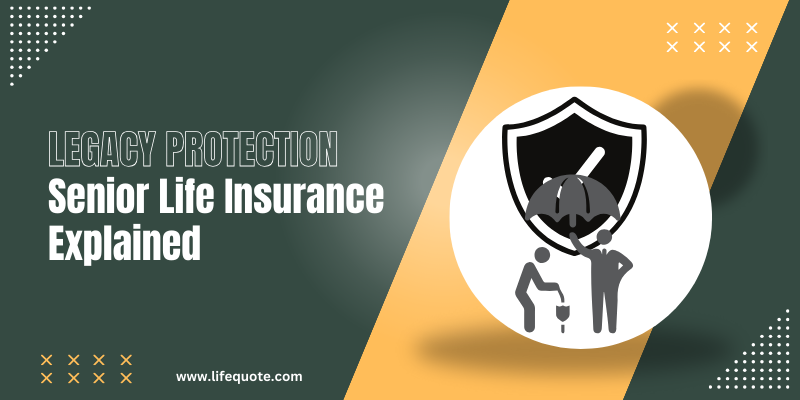- Speak to a licensed sales agent!
- (800) 521-7873
Understanding Life Insurance: The Basics

Understanding life insurance can be overwhelming, but we’re here to help. Before you start shopping, get equipped with the basic vocabulary and knowledge you need to make sense of all the basics of life insurance.
What Is Life Insurance and How Does It Work?
Life insurance is a contract between you and a life insurance company, which pays out a sum of money (called a death benefit) to designated beneficiaries upon your death, in exchange for regular premium payments. There are several types of life insurance that are detailed below, each with its own parameters and timing for paying out a death benefit, depending upon the needs of the insured.
Types of Life Insurance
Term Life Insurance:
Term life insurance lasts for a specified period of time, usually between 10 and 35 years, at which point the policy can be renewed or converted to a permanent life insurance policy. It’s typically the most basic and affordable life insurance option.
Permanent Life Insurance:
Permanent life insurance policies provide life insurance coverage for the insured’s entire life. Such policies accumulate cash value (explained later), and the payout is guaranteed at the completion of the policy. There are several different types of permanent life insurance:
Whole Life Insurance: Basic lifetime coverage with fixed premiums and guaranteed cash value accumulation.
>> Find out more: How does whole life insurance policy work?
Universal Life Insurance: Lifetime coverage with flexible premiums and death benefits, plus cash value accumulation
Index Universal Life Insurance: A type of universal life insurance whose cash value accumulates through the allocation of money to either a fixed account or an equity index account.
Variable Universal Life Insurance: A type of universal life insurance whose cash value accumulates via specified investment options. Typically, the most complex life insurance option requires a more hands-on approach from the client as well as a knowledge of investments and investment risks.
Survivorship Life Insurance:
These policies cover not just one but two insured individuals. In this instance, the death benefit is paid upon the death of the second policyholder. These policies are usually bough for estate planning purposes.
>> Find out more: Survivorship whole life insurance policy – Is it worth buying?
Key Life Insurance Terms to Know
- Accelerated Death Benefit: Provides access to a portion of the death benefit while the person is still living and is diagnosed with a terminal illness. Can be added as an optional rider, but is now included automatically on many life insurance policies.
- Beneficiary: the person or entity designated to receive the death benefits from a life insurance policy when the insured person dies.
- Cash Value: money that accumulates in a life insurance policy while in force that the insured can borrow from
- Conversion: The option to change a term insurance policy into a permanent policy, usually once the policy term is up.
- Contestability Period: A period after a death benefit claim is made, usually two years, when the life insurance company can contest a death claim. This is usually if the death was the result of suicide or criminal activity.
- Dividends: Money paid annually to policyholders as a partial return of paid premiums to reflect the insurance companies favorable financial standing. Not guaranteed.
- Financial Strength Ratings: There are 4 major industry rating agencies for financial strength, A.M. Best, Standard & Poor’s, Moody’s, and Fitch. These agencies provide information on insurance companies’ financial performance, stability, claims-paying ability, etc. Each agency has its own criteria and scale for rating companies, which can be found in detail on each of their websites.
- Lapse: Policy termination due to the failure to pay premiums
- Level Premiums: Premium payments which remain the same over the life of the policy
- Maturity: The time at which the insurance contract is paid to the policyholder if still alive
- Outlay: The actual cash payment you make to the insurance company for premium payments each year.
- Riders: Added benefits that can be purchased with a policy.
- Surrender value: The cash value of a policy if it is canceled before its maturity date
- Underwriting: The process of assessing health risk, ensuring that the cost to cover an individual life is proportionate to the risks associated with covering them. See below for the factors taken into consideration during the underwriting process.
Factors Affecting Life Insurance Cost - Age: The younger you are, the cheaper your rates will be because the likelihood of you dying is lower.
- Gender: Typically, women live longer than men. As such, insurance companies expect they will pay premiums over a longer period of time, which gives them lower rates than men.
- Smoking: One of the biggest red flags for life insurance companies, smoking is linked to a variety of illnesses and health issues. Smokers will end up paying more than non-smokers for life insurance.
- Overall health: The underwriting process is designed to properly assess your overall health risk. Any serious health conditions like high cholesterol or diabetes will affect what’s called your “risk class.” The higher your risk is, the higher your premiums will be.
- Lifestyle: any risky hobbies or occupations are likely to increase your health risk, thereby increasing your life insurance rates.
- Family history: Any family history of cancer, heart issues, or other serious medical conditions predisposes you to said ailments and increase your health risk and insurance premiums.
- Driving record: A history of reckless driving, DUIs, etc. especially within the last three to five years is likely to hike up your premiums.
Life Insurance Agents
LifeQuote offers its services to those individuals looking to make the most well-informed choice possible and understand what policy is right for them. Armed with knowledge and increased confidence, our satisfied customers have gone on to make educated decisions about the future of their life insurance policies.
>> Check out our customer testimonials
Take advantage of our professionally trained staff that is always available and ready to guide you in your journey toward understanding life insurance. Talk with a licensed insurance agent today. Do not be intimidated or confused by the various life insurance options available. Get informed. We will help demystify the life insurance policy process and will have you on the road to protection in no time.




